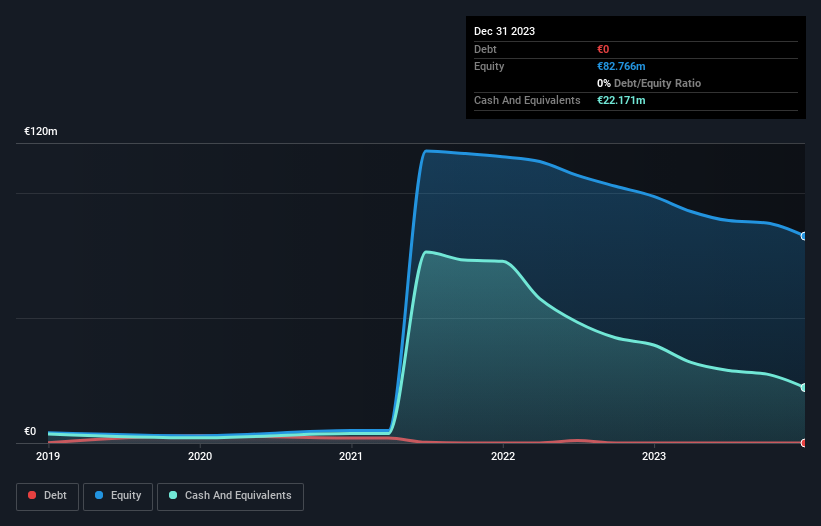- Norway
- /
- Healthtech
- /
- OB:NORDH
Here's Why We're Not Too Worried About Nordhealth's (OB:NORDH) Cash Burn Situation

Just because a business does not make any money, does not mean that the stock will go down. For example, although Amazon.com made losses for many years after listing, if you had bought and held the shares since 1999, you would have made a fortune. Nonetheless, only a fool would ignore the risk that a loss making company burns through its cash too quickly.
Given this risk, we thought we'd take a look at whether Nordhealth (OB:NORDH) shareholders should be worried about its cash burn. In this report, we will consider the company's annual negative free cash flow, henceforth referring to it as the 'cash burn'. The first step is to compare its cash burn with its cash reserves, to give us its 'cash runway'.
See our latest analysis for Nordhealth
Does Nordhealth Have A Long Cash Runway?
A company's cash runway is calculated by dividing its cash hoard by its cash burn. In December 2023, Nordhealth had €22m in cash, and was debt-free. Looking at the last year, the company burnt through €11m. So it had a cash runway of about 2.0 years from December 2023. That's decent, giving the company a couple years to develop its business. You can see how its cash balance has changed over time in the image below.

How Well Is Nordhealth Growing?
On balance, we think it's mildly positive that Nordhealth trimmed its cash burn by 16% over the last twelve months. Revenue also improved during the period, increasing by 17%. On balance, we'd say the company is improving over time. While the past is always worth studying, it is the future that matters most of all. So you might want to take a peek at how much the company is expected to grow in the next few years.
Can Nordhealth Raise More Cash Easily?
While Nordhealth seems to be in a fairly good position, it's still worth considering how easily it could raise more cash, even just to fuel faster growth. Companies can raise capital through either debt or equity. Commonly, a business will sell new shares in itself to raise cash and drive growth. By comparing a company's annual cash burn to its total market capitalisation, we can estimate roughly how many shares it would have to issue in order to run the company for another year (at the same burn rate).
Nordhealth's cash burn of €11m is about 4.9% of its €222m market capitalisation. Given that is a rather small percentage, it would probably be really easy for the company to fund another year's growth by issuing some new shares to investors, or even by taking out a loan.
How Risky Is Nordhealth's Cash Burn Situation?
As you can probably tell by now, we're not too worried about Nordhealth's cash burn. For example, we think its cash burn relative to its market cap suggests that the company is on a good path. Its weak point is its cash burn reduction, but even that wasn't too bad! Based on the factors mentioned in this article, we think its cash burn situation warrants some attention from shareholders, but we don't think they should be worried. On another note, we conducted an in-depth investigation of the company, and identified 2 warning signs for Nordhealth (1 doesn't sit too well with us!) that you should be aware of before investing here.
If you would prefer to check out another company with better fundamentals, then do not miss this free list of interesting companies, that have HIGH return on equity and low debt or this list of stocks which are all forecast to grow.
Valuation is complex, but we're here to simplify it.
Discover if Nordhealth might be undervalued or overvalued with our detailed analysis, featuring fair value estimates, potential risks, dividends, insider trades, and its financial condition.
Access Free AnalysisHave feedback on this article? Concerned about the content? Get in touch with us directly. Alternatively, email editorial-team (at) simplywallst.com.
This article by Simply Wall St is general in nature. We provide commentary based on historical data and analyst forecasts only using an unbiased methodology and our articles are not intended to be financial advice. It does not constitute a recommendation to buy or sell any stock, and does not take account of your objectives, or your financial situation. We aim to bring you long-term focused analysis driven by fundamental data. Note that our analysis may not factor in the latest price-sensitive company announcements or qualitative material. Simply Wall St has no position in any stocks mentioned.
About OB:NORDH
Nordhealth
Provides healthcare software solutions in Norway, Finland, Sweden, Denmark, Germany, and internationally.
Flawless balance sheet with concerning outlook.
Market Insights
Community Narratives




